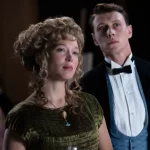Alice Through the Looking Glass: Logic and Proportion Have Fallen Sloppy Dead, by Scott Nye
Tim Burton’s Alice in Wonderland is one of those strange 21st-century box office smashes that has remained completely unmemorable and which few seem to particularly like. The sequel, then, has the advantage of a world and design scheme audiences seem to dig, but the chance to tell any kind of story they wish. And, indeed, as Alice Through the Looking Glass opens on a battle at sea, you might wonder if you’ve wandered into the wrong theater and/or In the Heart of the Sea was receiving some sort of ill-conceived revival. But fear not, for we are more firmly out of the Burton’s strange tactic of making the story that of a grown woman reliving a child’s journey, and into the story of a grown woman launching her own sort of adventure. Director James Bobin might not be able to avoid all the toxic elements Burton established, but he does more with them than his famous predecessor.
After reaching land and dealing with all those matters Victorian women must attend to (much ado about marriage and property), Alice (Mia Wasikowska) tumbles through a permeable mirror, on the other side of which lies her beloved Wonderland and all the friends she holds so dear and stuff. There’s the White Queen (Anne Hathaway), Tweedledee and Tweedledum (Matt Lucas), Absolem the caterpillar butterfly (the late Alan Rickman, to whom the film is dedicated), the Cheshire Cat (Stephen Fry), the White Ra—wait a minute, aren’t we getting rather far down the cast list before mentioning The Mad Hatter? Alice’s greatest and dearest friend, according to the requirements of casting Johnny Depp as a rather insignificant character? Well, it turns out the Hatter is quite sad and has shut himself away, having recently become convinced his dead family is actually alive, which nobody quite believes – after all, the man is insane and has given nobody reason to trust him about much of anything – but which Alice is at least keen to investigate. Even better, it turns out there are means available for her to travel through time, so that she might go back to the moment of their deaths and reassure at least herself that what’s done is done.
If those loosely familiar with Lewis Carroll, on whose late-19th-century novels these films are ostensibly based, feel a little lost in all this, let me confirm your suspicions – this has very, very little to do with the novel Through the Looking-Glass, and What Alice Found There. I doubt one could say the characters are even the same. So one more or less has to make the decision to take as little consideration of that estimable work as the film does, or find one’s way home to its loving embrace. Which is not to say that the particulars of the film are wholly acceptable either. The overarching story would serve a decent enough entryway into what becomes quite an exciting plot, were it not for the fact that Depp’s work as the Hatter is an emotional black hole, the absolute epitome of every performative stereotype his post-2004 work has largely, and more or less rightly, acquired. Fortunately for us, he is also largely absent from the film, left home in bed while Alice journeys through time to try to right the wrongs of history, only to find that the deeper she goes into this newfound hole (this sentence took an unfortunate dive itself), the more intractable Time becomes.
I capitalize that elastic word because, here, Time is personified by a Herzog-voiced Sacha Baron Cohen. His character keeps all things ticking, and hunts Alice across the ages after she steals his all-powerful Chronosphere. He’s not precisely pitched as a villain, just someone whose interests are at odds with Alice’s; more threatening, perhaps, is the Red Queen (Helena Bonham Carter), but even she is more another player in the story than its antagonist. Pitching these characters in this manner lends a considerably-less sinister tone to the proceedings than Burton’s films, which, lest we forget, culminated in an actual battle with actual monsters and Alice wearing actual armor. I’m sure it all made sense in a pitch meeting. Here, though, the forces Alice must contend with are centered more around realizing one’s limited capacity to change the course of history, to tell one’s own story, which is at once a simpler and more complex enemy. Bobin and Disney house screenwriter Linda Woolverton push Carroll’s world in more ways than Burton’s instagram-filtered fantasia, expanding upon and truly reimagining the loose situation the author placed his would-be heroine.
While the supporting cast remains fairly well-engaged, Wasikowska is given something of a cipher to play, and offers little more than a scowl to play it with. Without an ounce of clever dialogue, surrounding by green screen, and forced into pouring her heart out to Depp’s clown face, I can hardly fault Wasikowska for her lack of resource, only commiserate that we’re both stuck investing in the same forced scenario. Cohen (whose work with Bobin goes back to Da Ali G Show) and Carter are better-deployed, the two teaming well again after successfully pairing in Sweeney Todd and Les Miserables. I had forgotten just how surely Carter found her mark in this role, her aim no less true here, and while Cohen’s vocal choice may seem a tad obvious to the cine-literate in the audience, he is one of those performers for whom nothing in this very silly movie is too silly, and the film benefits considerably from his creative investment in it.
But there’s much to enjoy, what with the time-traveling, the expansive set design, and the endless series of unnecessarily-elaborate hurdles for Alice to vault. One could rest easily in the knowledge that no serious harm will come to her, or simply agree to the fun of having her dodge the hands of a massive clock, ride the literal waves of time, rush to stop a child-aged Red Queen from bonking her head, or, indeed, race against time itself as a simple blunder causes all of Wonderland to be gradually consumed by wood. Say what you will, these are not the sort of things one usually sees, even by the increasingly-cartoonish world of big-budget cinema. And while much of the summer blockbuster season races toward mundanity (just how politically-relevant and realistic is Captain America: Civil War?), I was more than happy to be carried along by this particular brand of silly. It may not be the sort of nonsense Carroll practiced, but nonsense it is.






























